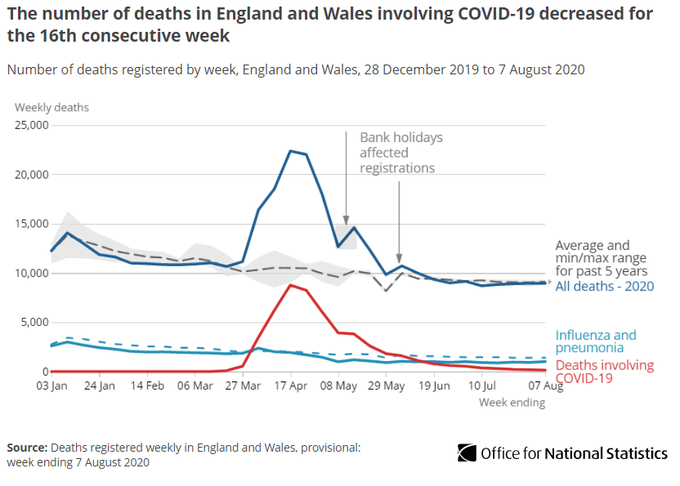The UK coronavirus death rates have been in steady decline. From an all-time high of over 1’100 daily deaths in late April, the UK has been recording fewer and fewer deaths despite the easing of restrictions. According to the ONS, in the week leading up to the 7 August, 152 people sadly lost their lives to COVID19. During the same week, over 1,000 people died of pneumonia and flu.
At the height of the pandemic, nearly 9’000 people passed away from coronavirus in one week, and at that time, authorities recorded only 2’000 flu or pneumonia deaths. A very different picture emerged eight weeks ago when authorities recorded 783 deaths versus over 1’000 flu and pneumonia fatalities. Since then, the gap has widened further. ONS-figures tell us that in the eight weeks up to the first week of August, 7’639 people died of pneumonia and flu, with 3’144 COVID19-deaths during the same period.
For 16 weeks now, the UK coronavirus death rates have been falling. Only the North West and Wales experienced an increase with eight regions, including South East, North West, East, West Midlands, London, Yorkshire, and The Humber, South West, East Midlands, and the North East experiencing a decline.
Moreover, the total number of UK deaths of all causes is down in six regions of England when compared to the five-year average. But the death rate in private homes is still well above the norm, indicating that people who are seriously ill may be too scared to go to the hospital because of COVID19.
When explaining the overall fall in fatality numbers, ONS experts say that this decline may indicate people passed on earlier because of coronavirus. The spring figures were well above average as a result, with the recent drop evening the annual death rates out.
The ONS figures also show that fewer people are dying of conditions like heart disease because they pass away from COVID19 instead.
UK coronavirus death rates – Public Health England forced to cut 5’000 off its official tally
The UK COVID19 death toll has been the subject of many debates. Last week, Public Health England had to deduct 5’000 COVID19 deaths because it had been recording them even when the deceased had recovered and died of an entirely different cause.
Like Scotland and Northern Ireland, the government is now only recording a fatality as a COVID19 death, if the person passes away within 28 days of a positive test result.
ONS figures show a sharp rise in depression
The Office for National Statistics examined the impact of coronavirus on mental health, comparing levels of depression before and during the pandemic. Women, people with a disability, or with financial difficulties as well as young people between the ages of 16 and 39 reported suffering from mental health issues.
The ONS survey team spoke to the same adults before and during the COVID19 pandemic and thus produced valuable insight into its effects. Whereas before the coronavirus crisis, only 1 in 10 adults reported suffering from depression, 2 in 10 people experienced mental health difficulties during it.
12.9 per cent of adults reported moderate to severe symptoms of depression, and only 1 in 25 saw an improvement during this time. The ONS also found that people unable to meet a financial emergency of £850, people with disabilities, women, and young people aged 16-39 were among those worst affected. The majority of those suffering from depression during the pandemic said they were feeling anxious and stressed.
While just over 20 per cent of people with none or only mild symptoms said, the pandemic impacted their relationships, more than 2 out of 5 people with significant people attested to this.




